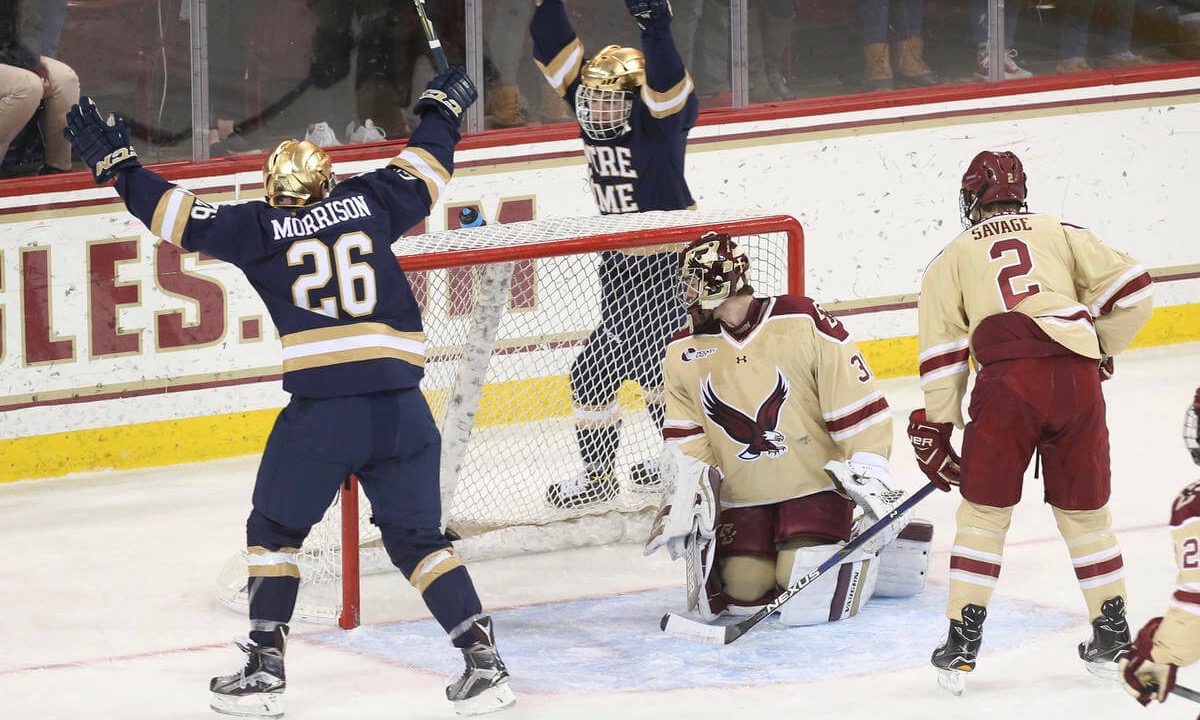It’s the most wonderful time of the year — bubble season. While college basketball pundits are debating whether or not to let Nebraska into a legitimate post season tournament, college hockey will only be punching 16 tickets to its tournament, which begins in late March. That means the bubble debates on who’s in and who’s out actually involve teams that have had pretty good seasons. The teams that sneak in as four seeds with at-large bids have legitimate shots at making noise in the tournament, which makes the bubble debate such high-stakes.
Before we can get to March Madness on ice, there are six conference tournaments that need to be played out first. Five of those tournaments start this weekend, while NCHC teams wrap up their regular season with one final series. With the winners receiving automatic bids, the bracket could shift drastically if things go off the rails early in the conference tournaments. So to get you prepared, here’s a look at the playoff picture as it stands.
Automatic bids
Atlantic Hockey: Mercyhurst
Big Ten: Notre Dame
ECAC: Cornell
Hockey East: Boston College
NCHC: St. Cloud State
WCHA: Minnesota State
These are the regular season winners of each conference. Obviously, a few of these teams can (and probably will) get upset in the coming weeks, but we’ll pencil them in now to represent the six automatic bids. In reality, I see Notre Dame, Cornell, St. Cloud State and Minnesota State as locks no matter what happens over the next few weeks. BC is a case I’ll talk more about below and Atlantic Hockey will be a one-bid league.
Other locks
Denver (NCHC)
Ohio State (Big Ten)
Clarkson (ECAC)
Denver has been a top five team all season and pushed St. Cloud State in a competitive NCHC race. Ditto for Ohio State and Notre Dame in the Big Ten. Clarkson is a curious case because they just managed to snap an 8-game winless streak in the last game of the regular season. But that was after a 14-game winning streak from November-January that put them into the top five nationally. Getting cold at the end of the year doesn’t give me a ton of confidence in them to make a deep run, but they’ve done enough to get themselves a spot.
Not quite locked in yet
Minnesota Duluth (ECAC)
Minnesota (Big Ten)
Michigan (Big Ten)
If we picked the bracket today, these teams are in with no sweat. UMD has done enough over the second half of the season to convince me that they are worthy of an at-large bid. But with another regular season series against a wild card Miami team before the NCHC tournament opening round, there’s still too much potential for a last minute collapse to lock the Bulldogs in yet. It wouldn’t be surprising for one of Minnesota and Michigan to make a run at a B1G title, but with Notre Dame and OSU locked in, an early exit could be bad news.
Last four in
Northeastern (Hockey East)
Providence (Hockey East)
Penn State (Big Ten)
Omaha (NCHC)
Hockey East is where things could get very interesting. Based on the PairWise rankings, which are designed to quantify teams based on the criteria used by the selection committee, Northeastern and Providence both have better resumes than Boston College. Say BC loses in the HEA title game to either of the two — they’re right in the conversation with other bubble teams. Losing early would be largely detrimental for their chances. Omaha has a big opportunity this weekend with Minnesota Duluth on the schedule — the winner of that series puts themselves in a good spot. Penn State can cause trouble for Minnesota in their first-round matchup, but a quick exit could leave them on the outside looking in.
Last four out
North Dakota (NCHC)
Union (ECAC)
Northern Michigan (WCHA)
Bowling Green (WCHA)
It seems crazy that UND is in this spot, but that’s where they’ve landed themselves. There’s a not-so-unrealistic scenario where they finish seventh in their league, which would set up a first round series at Denver. They can avoid that and help their PairWise ranking with wins this weekend over St. Cloud State. Union finished second in their league and the WCHA teams went 2 and 3 respectively. It’s a tough path for them to get an at-large bid, but should any of them make a run for a conference title, somebody currently in the “last four in” is getting bounced.




